
by Michael Kunkes
We all know what a guilty-pleasure movie is, although it can be rather hard to define. They are the kinds of films that you really like, but will not dare to reveal your appreciation of them to friends, co-workers or random bystanders for fear of derision, laughter or just blank stares. They are the movies you will watch on TV at 2:00 a.m. for the 20th time––even though you already own them on DVD.
They may not make a statement or they may slap you in the face with one; they may contain corny humor, bad music, horribly dated dialogue, hokey special effects or acting that “runs the gamut of emotions from A to B,” to paraphrase Dorothy Parker. Often, we can’t explain why it is we like these movies; we just do.
CineMontage has turned to the Guild’s erudite, critical and scholarly branch––the story analysts––and asked them to venture deep inside their inner film geeks, to forget that their professional reputations could be at stake and to admit to the world––or at least to their fellow Guild members––what their favorite guilty pleasure movies are. Following are some of their confessions:
I hate the term “guilty pleasure” for no other reason than that I’m reluctant to feel guilty over something that I truly enjoy. But I understand what the term has come to mean and I accept it even if I don’t really like it. That said, my penchant for 1950s sci-fi, schlocky horror and the oddball exploitation flick (and boy, do I love Turner Classic Movies’ Friday night TCM Underground film series!) means that I have a whole bunch of such pleasures.
Choosing just one film is difficult, but here’s one with a damn good array of talent: an Academy Award-winning writer, one of the most likeable and commercially successful actors of his generation and a one-time America’s Sweetheart. Yes, I’m talking about writer-director John Patrick Shanley’s Joe Versus the Volcano (1990), starring Tom Hanks and Meg Ryan.
It has since undergone a mild critical resurgence, but at the time almost everyone hated it. A good friend actually phoned to specifically warn me not to see it. Fortunately, I ignored that advice and instantly fell in love with that under-appreciated and greatly misunderstood film––one of the quirkier romantic comedies of its time. It was Shanley’s directorial debut and one of Hanks’ few flops. And Meg Ryan played three different characters.
Still, it was Dan Hedaya who nearly stole the show as Joe’s boss, and Robert Stack’s Dr. Ellison has the single most memorable line with his diagnosis of Joe’s “brain cloud” (a line I often quote when I have a headache). My wife liked the film as well, proving once and for all that we were compatible. But I can’t blame anyone for not “getting it.” As a story analyst immodest enough to consider myself right more often than wrong, I likely would have given Shanley’s screenplay a “pass.” I’m sure some analyst did, and I’m glad no one listened.
Ray Kolasa
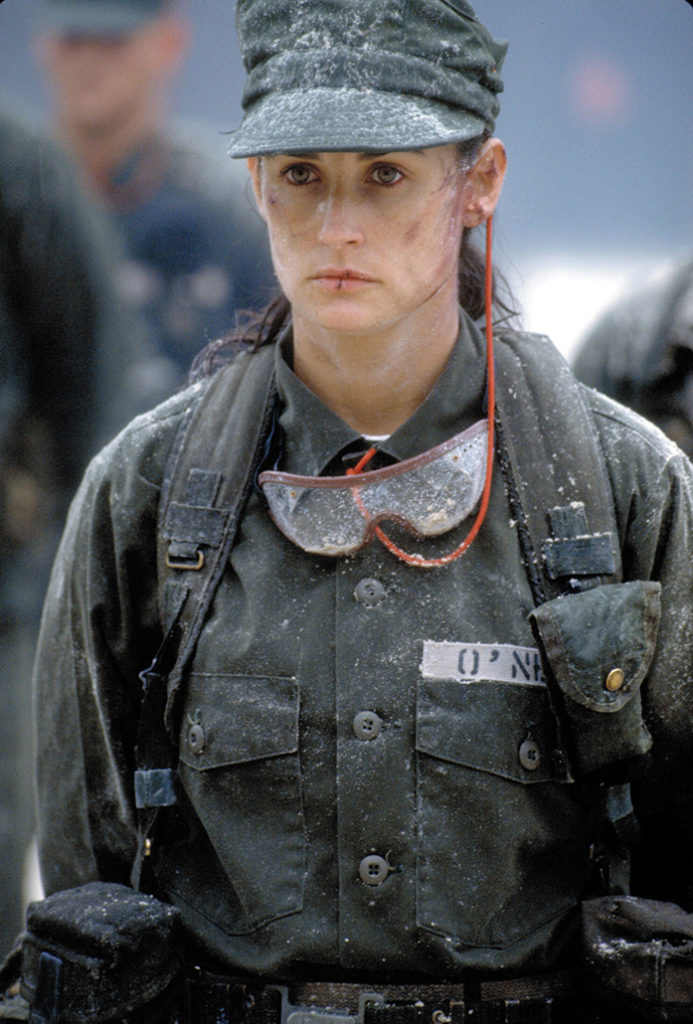
Hollywood Pictures/Photofest Copyright Hollywood Pictures
Here’s the thing. In my view (admittedly, often more than a little twisted), guilty pleasures are films I’m ashamed to admit I adore. Full-bore, red-in-the-face humiliation time. Do such films have redeeming social value? Are you nuts? But are they fun? Oh, my yes! One of my all-time favorites (people who respect me, please do not read further) is G.I. Jane (1997). God help me, a really chewy candy kind of film. Demi Moore at her feistiest, and, people, which of us does not adore a large dose of feist?
This story of a Naval officer’s acceptance into and passage through the fearsome SEALS training program won some favorable re-views. Variety’s Todd McCarthy labeled it “Flashdance in fati-gues” while Rolling Stone’s Peter Travers termed it a “…surprisingly scrappy work-out.” And, he went on, stunningly muscle-bound, shaven-headed Demi Moore “never looked better.” High praise indeed.
Directed by Ridley Scott (the man certainly does know his action), this is a film that has message out the wazoo, delivered of course with sledgehammer subtlety. Every frame screams, “Women are not given equal treatment in the military.” And Demi refuses to put up with that. How can you not love Demi standing up for all of us left behind for want of a dangling euphemism? This setup of course requires that virtually every male in the film (all very handsome and hunky to be sure) is plumb against the idea of the little lady invading their turf. But plucky Demi sees it through. Sees it through? Hell, after one bloody encounter with her trainer, Demi screams out, “Suck my dick!!!” Ladies, does she not speak for all of us? A helluva film, I’m ashamed to admit.
Susan Merzbach
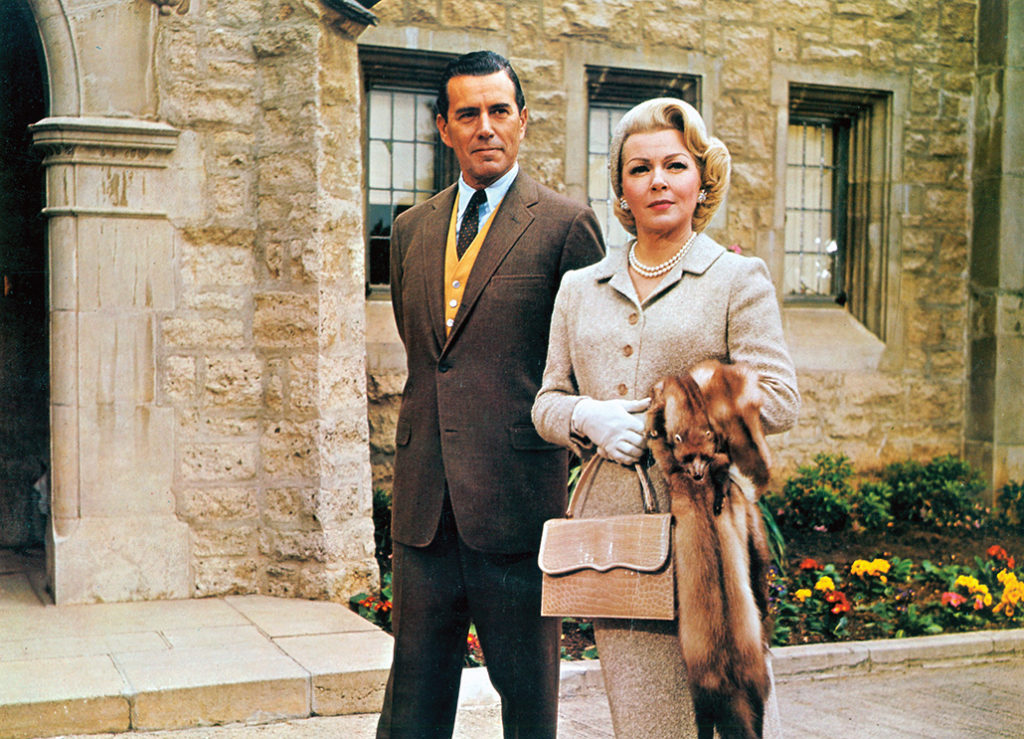
Photofest/Universal Pictures Copyright Universal Pictures
Certainly for me, one of the great guilty pleasures is the Lana Turner version of Madame X, directed by David Lowell Rich and produced in 1966 by Ross Hunter, who tried valiantly to reclaim the magic of Douglas Sirk’s Imitation of Life (1959). But the movie feels at least a decade behind the times––and did even then––yet somehow its mission to extract tears always works.
Lana all but reproduces her legendary real-life testimony regarding the messy death of lover Johnny Stompanato, and giving an impassioned speech from the stand as to why she abandoned her son––all while composer Frank Skinner’s violins whine sadly in the background. Who can resist the contrived schematic of the story? It races through years of exposition and a tangle of plot conveniences just to deliver Lana, the perfect martyr, to that melancholy courtroom where bathos reigns.
Lana has her moment, facing the son she was forced to give up, yet maintaining what’s left of her dignity while John Forsythe suppresses tears of regret. All this, and a deathbed speech a few moments later. It’s irresistible.
Doug Soesbe
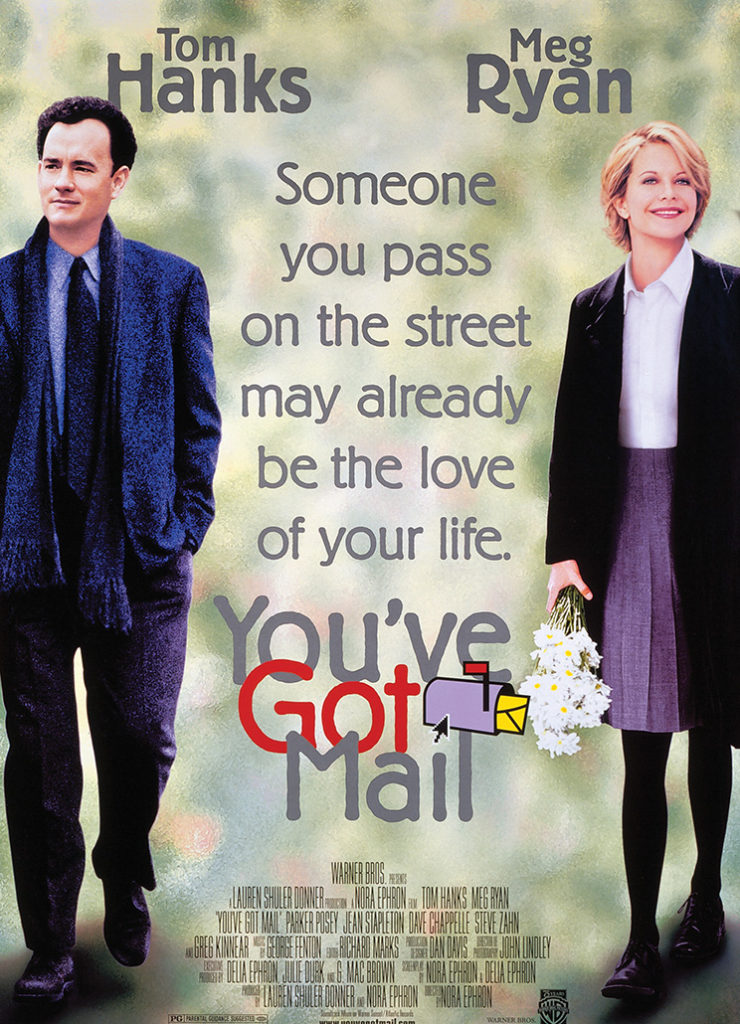
Warner Bros./Photofest Copyright Warner Bros.
I hate romantic comedies. As a story analyst for 20 years, I have read literally thousands of them: rom-coms with wedding themes, rom-coms where the couples fight for two hours, rom-coms with ridiculous non-obstacles to true love, rom-coms where the couples switch bodies with each other or their pets, blah blah blah…
I don’t really hate romantic comedies, but most annoy me. They’re contrived and silly, and have little to do with romance. A good rom-com makes you feel butterflies in your tummy, despite the inevitability of the outcome. There are (plausible, non-sleazy) barriers to love, but we happily anticipate their resolution. The lovers are smart; they have interests and traits. Their friends and family are real people, not props. The lovers are stubborn and prideful, but they let down their guard for the right person. Chemistry between the lovers is the key ingredient. A writer can try to convey that spark on the page, but it really ignites on the screen between two actors: Hepburn and Tracy, Beatty and Christie, Sandler and Barrymore.
My guilty pleasure is Nora Ephron’s You’ve Got Mail (1998), starring those remarkable charmers Tom Hanks and Meg Ryan. Hanks represents the business of book selling while Ryan appeals to the childhood heart of the book lover. The future couple is at odds in business, but in synch where it counts: compatibility, humor, common interests and perspective. I believe they should be together, and I root for them. Hanks’ patient tenacity to win over Ryan, once he realizes that his e-mail penpal is his bookstore rival, is sweet and adorable. When she sees him and the dog waiting in the garden at the end, I melt. A good rom-com evokes the tremulous feelings of real love, as ephemeral and universal as that. You’ve Got Mail does it for me.
Mary Woods Brown
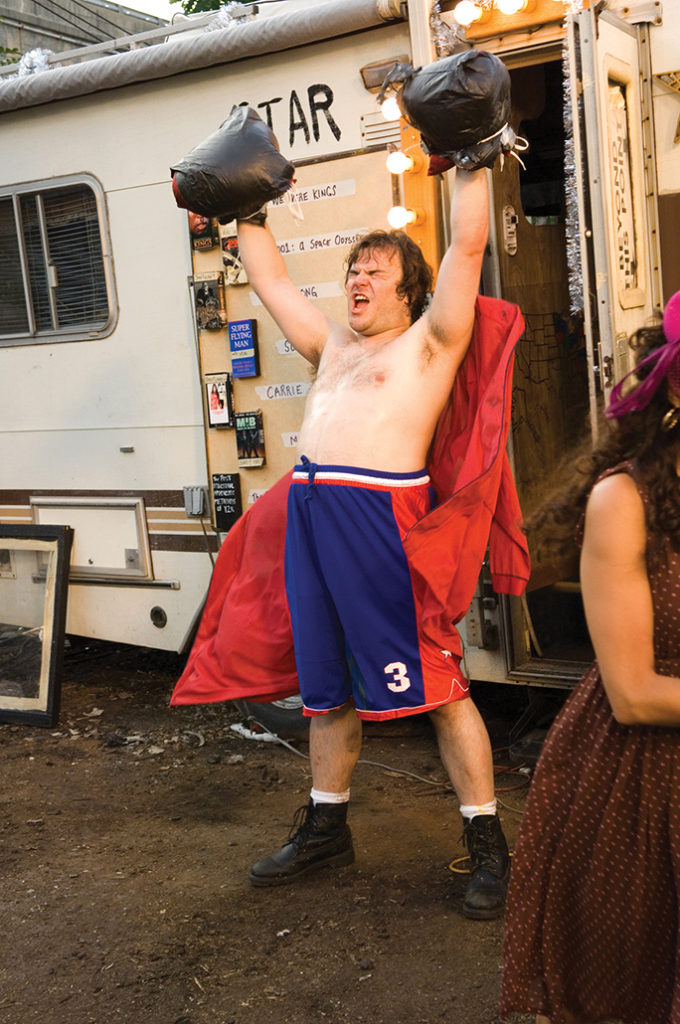
New Line Cinema Copyright New Line Productions
If I were to pick my favorite guilty pleasure based on a single block of dialogue, it would be Danny DeVito’s Death to Smoochy (2002) for this gem: “I’ve never owned a gun. I don’t believe in them. When we were kids, and my brothers and I played cowboys and Indians, I was always the Chinese railroad worker.”
But I choose Michel Gondry’s Be Kind Rewind (2008) because too many moviegoers have pooh-poohed or overlooked this film, which makes me laugh myself silly. I know, I know. The building demolition storyline is a little Brady Bunch and Jerry’s plot against the evil power plant is goofy, yet once the trio (Jerry, Mike and Alma) starts “Swede-ing” (re-making) well-known movies, I’m hooked.
The film re-creations are always inventive, often intricate and sometimes so beautifully simple that films like Boogie Nights and Last Tango in Paris appear as sweet love stories. Somehow, the “Swede-ed” Umbrel-las of Cherbourg clip captures its own brand of grace similar to the original. The Xeroxed facemasks Jerry and Mike wear in the negative, day-for-night Ghostbusters scenes make me snort-laugh. The stop motion, cheese pizza behind the mannequin’s head (to mimic blood) in Boyz n the Hood is genius. And Jerry’s obnoxious portrayal of Daisy in Driving Miss Daisy is ridiculous fun. If Jack Black delivering the line, “A ‘w’ is like a mountain turned upside down, isn’t that clever?” doesn’t make you giggle, I don’t know what to do with you.
Amusing, yes, but it’s also inspiring to watch the trio creatively regress to the priceless age of 11 or 12 when imagination peaks, ego is embryonic and artists aren’t sniffing out audience approval. After the studios threaten to sue over the “Swede-ed” movies, liberated filmmaker Jerry has a revelation: Nobody can dictate what films the trio makes. The result is a bogus but touching Fats Waller biopic that reminds us we don’t need permission to make art. Maybe Be Kind Rewind isn’t a guilty pleasure after all. Maybe I should have written about Death to Smoochy.
Carolyn Quinn
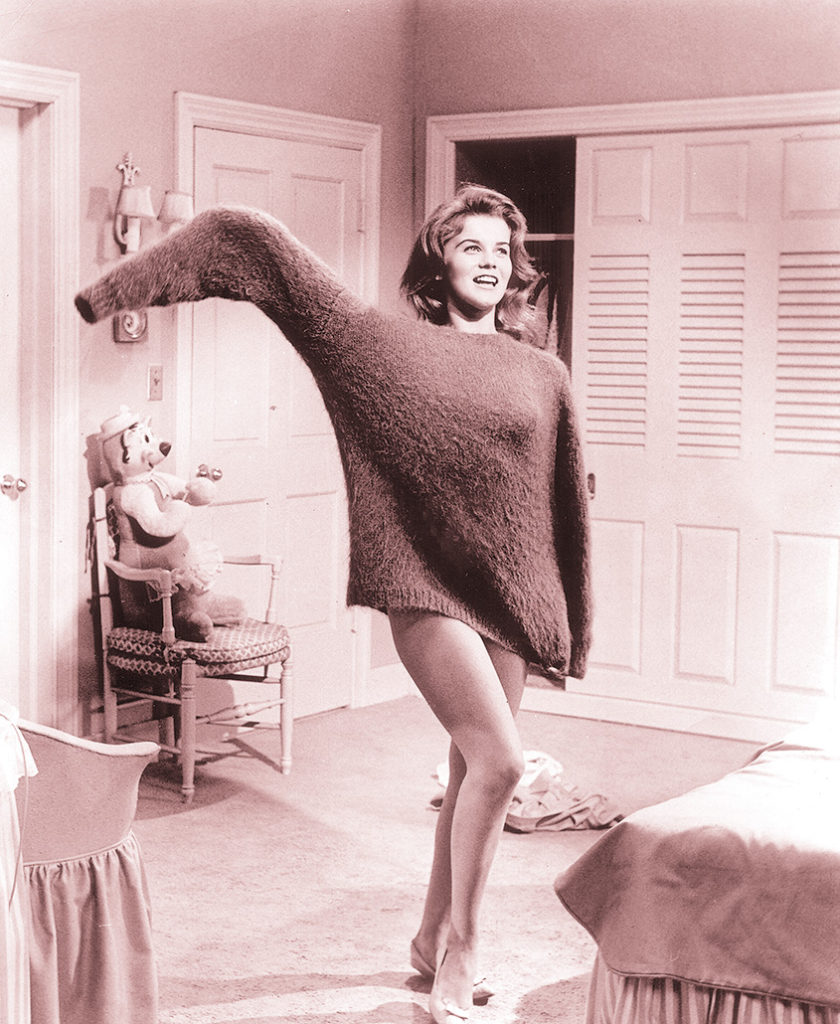
Columbia Pictures Corp./Photofest Copyright Columbia Pictures
Many of my guilty pleasures are arguably decent or even good movies; so why do I feel guilty that they give me pleasure? Some are childhood favorites, so maybe I’m guilty of never having outgrown them. I have always been––and always will be––smitten with Ann-Margret in Bye Bye Birdie (1963), as well as Viva Las Vegas(1964)––the latter being a famous Elvis kitsch classic. George Sidney directed both, so I guess we shared an appreciation. Ann-Margret’s sensuality still sets the screen smoldering over 40 years later. Witnessing the chemistry between her and Elvis feels almost voyeuristic–– which I guess is another reason to feel both guilt and pleasure.
I first experienced a very different guilty pleasure in a re-release matinee at my local theatre—The Man Called Flintstone (1966), an animated spy movie-cum-musical that featured a catchy title theme and voices from the hit TV series (I know what you’re thinking––but just because Wilma was a redhead doesn’t make her Ann-Margrock). I recall being impressed with how this movie simultaneously embraced the conventions of the TV series, musicals and spy movies (there are Cold War references and various European settings)––and I was only ten! Until I saw The Godfather a few years later, my answer to “What’s your favorite movie?” was The Man Called Flintstone (allegedly based on novels by “John Le Quarréy”).
Honorary mentions: Altered States (1980) and Twister (1996) are fun effects movies. I enjoy the fearless excesses of Ken Russell’s famous-composer biopics, such as The Music Lovers (1970) about Tchaikovsky, and Mahler (1974). And then there’s perhaps the guiltiest pleasure of all: the singing, dancing cockroaches of Joe’s Apartment (1996).
David Bruskin
Editor’s Note: Additional “guilty pleasures” of story analysts can be found at www.editorsguild.com.
A longtime contributor to Editors Guild Magazine (the predecessor to CineMontage) and the Guild’s website, Michael Kunkes was a freelance writer and editor specializing in post-production, production and and animation. He passed away in March 2010.





